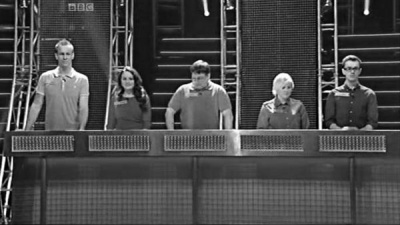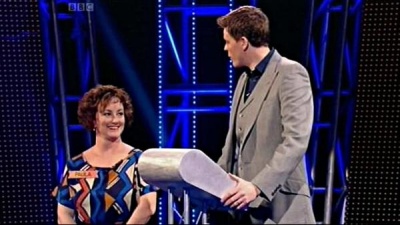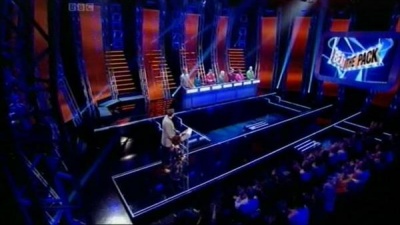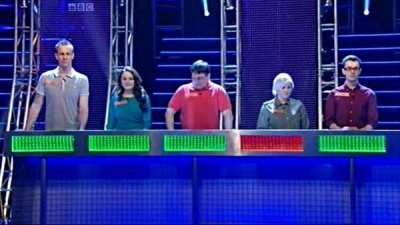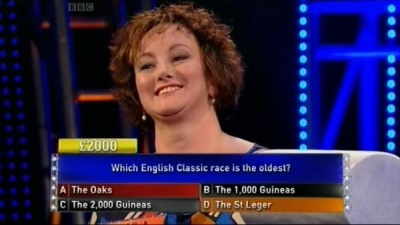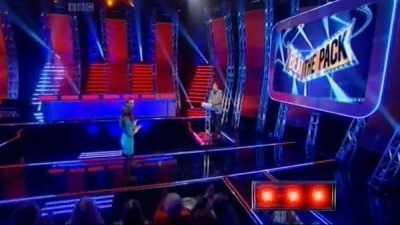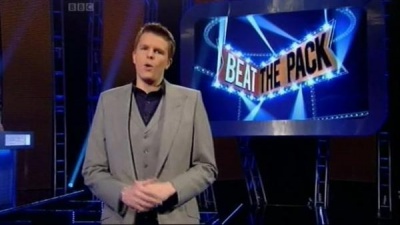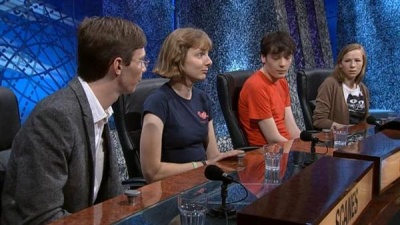Weaver's Week 2013-03-31
Last week | Weaver's Week Index | Next week
Last Saturday, Pointless Celebrities on BBC1 had a discussion about the plays of Terence Rattigan. Saturday Night Takeaway on ITV revived PJ and Duncan's second-greatest hit "Let's get ready to rhumble", and has propelled it to the top of the downloads chart. We have no evidence about a sudden upsurge in Rattigan shows.
Contents |
Beat the Pack
BBC1, 4-29 March
It's been a good few years since Jake Humphrey was the king of mid-afternoons on BBC1. Fabulous shows like Rule the School, CBBC Fame Academy, Gimme a Break, and Bamzooki. After too long in the wilderness, and being beaten as the Tallest Man on Telly by Richard Osman, Jake's back in this daytime quiz programme.
Joining him in the studio are eight people. One of them has been selected to start as the player in control, facing a huge video wall at the other end of the studio. The other seven line up behind a long desk, running the length of the set. If Nick Knowles were hosting this show, he'd doubtless squeeze in a reference to The Magnificent Seven, and use it so often that it grates. But it's Jake Humphrey hosting, and he calls them "The Pack", and we're better off.
The player in control is shown a board with six categories on it. These are precise categories – not "actors" but "Merryl Streep", not "entertainment" but "Eurovision Song Contest". The player picks a category, and is asked a question with four possible answers. The Pack give their answers, and a sound effect plays when all have responded.
And then the discussion begins. Jake and the player in control have a long chat about the possible answers to the question, and whether they're going to play it or not. A correct answer to this first question is worth £2000, and gives the player in control the opportunity to remove any player at the bench. An incorrect answer will remove the player in control from the game, and the best player from The Pack will step forward and take their place.
Usually, the player in control will decide to pass the question. At this point, there's an extended sequence where lights in the desk flash, before eventually coming to rest as either green or red. Green indicates a correct answer from that player, red a wrong one. The sole indication of whether an answer was right or wrong is the colour – there's no tick, cross, or other way of telling them apart. A fair proportion of the viewing public, and a large percentage of the host, will have difficulty telling isolated green lights from red ones; this accessibility failure is made more irritating by the fact it could be resolved very easily.
Anyway. Whoever in The Pack has given the correct answer will be allowed to go to the safe area, a soft seating area behind the player in control's shoulder. These players cannot be eliminated in the current round. Should all of The Pack qualify for the safe area, then the player in control is eliminated as if they'd given a wrong answer. Jake talks up this possibility often, even when it's unlikely (will five people really get this question right?)
Having passed on a question, and at least one of The Pack erred, the game continues. The value of the question is halved, to £1000, and the cycle repeats.
The net result is that each category is played with one fewer contestant – either the current player in control, or one of The Pack will be eliminated after each round. As well as managing the order of categories, the player in control has one small advantage – when answering a question, they can give a Double Answer. This advantage lets them pick two answers to the current question, and continue if either answer is right. The player can only play this once.
There's one massive flaw in this programme: when the player in control changes, all the money they've built up goes with them. The Pack has no tremendous reason to beat the player – often, the daily prize is for around £500, and about a quarter of episodes give away Zero Pounds, just the chance to return as the player in control next time. Is it better for The Pack to let the contender remain, build up a substantial jackpot (£12,000 is possible, £6000 achievable, £3000 realistic), and let one of them take a punt at the endgame?
Said endgame is 75 seconds of rapid-fire questions; when the player in control errs, the question is thrown over to the last of The Pack. Three correct answers on these thrown-over questions means that Packer scoops the pot, otherwise it remains with the player. Shades of The Chase, there.
There's actually a lot to like about this show. The set uses its length well, there's a sightline for the player in control, the length of the desk is right. The graphics, other than the right-wrong answers, are clear and distinct. Jake Humphrey we've liked for years, he brings in just enough authority to control the show without taking it over. At times, we're reminded of One Versus One Hundred played in reverse. The questions are perhaps a little askew: the £2000 questions tend to be dull know-it-or-not quiz trivia ("which is the oldest flat racing classic?"), those in the final a little too easy.
Perhaps the worst sin is the show's pacing. At heart, this is a half-hour programme padded out to an unnatural length. We can tell this from the top prize of £12,000; it's £10,000 with an extra question bolted on. We can tell this from the way Jake's conversation runs on, and on, and on, to the point where we find ourselves nodding off and dreaming of the lovely Mimi.
Ideas to improve the show? Something other than red-green lights is simple. Chopping one player from The Pack and having a 30-minute show isn't going to get past the BBC commissioners, even if they combine three games into two shows. Doing a Perfection, two games in one broadcast, winner stays on, that could work. So could letting each show run to its natural length, and straddling across the week.
Not completely draining the pot would also help. Changing the player means there's zero score on that question: it reduces the maximum amount by £2000, the realistic amount by perhaps £500, and that feels like penalty enough.
Other commentators have found flaws with the endgame. We reckon that three steals from the last of The Pack is a good rule. The player in control might face 12 questions, and be awarded 10% of the prize fund for each correct answer they give unless it's all stolen. This also has the effect of reducing the budget slightly – there's likely to be no fee for questions that beat both players.
Overall, we're warm to Beat the Pack. It needs work for us to really like it, and if it ends now we'll remember an OK afternoon quizzer that could have been so much more. And should it not return, we might just pilfer the idea, write some questions of our own, divide the prize by 100, and stage it amongst friends.
University Challenge
Group phase, match 8: Pembroke Cambridge v King's Cambridge
It's a comedy of errors this week. The quiz begins with Pembroke making a missignal, letting their opposition race into a lead. King's don't know much about herbs or works in modern economics, and Pembroke confuse their ellipses with hyperbolae. When no-one identifies an old flag of Iraq, King's has established a lead of 45-(-10).
Mary I is twice an answer in the opening ten minutes; in neither time is it correct. Pembroke got the old flags, being mostly as seen on Eurovision circa Riverdance. King's do well on shipping forecast areas, and remember the ancient tribe the Belgii. We've been quietly impressed with Fran Middleton, the captain of King's, who when told her answer was completely wrong, says "I agree, that was very wrong. Sorry!" Humility and candour and a bleak sense of humour: we like.
King's go on to find a hole in their knowledge, Normal statistical deviations. Pembroke has incurred yet another missignal, so by the audio round (emigré composers), King's lead is up to 115-0. "There's plenty of time," suggests Thumper to Pembroke, a curse from which precisely one team has ever emerged victorious, and that was only in the very last second. Pembroke does stage a bit of a comeback, getting three starters in a row, and most of the bonuses. By the second visual round, details of works by Blake, the lead has plummeted to 135-80.
Game on! Pembroke promptly secures an unusual achievement: all four members have incurred a penalty for an incorrect interruption this week. They do pick up the next starter, but none of the bonuses. Pembroke gets another missignal on a question beginning "A rich American tart", which just has us going madly off in a completely wrong direction. Another starter and one bonus for Pembroke, and they can carbon-date the Victoria Cross to the 1850s. King's pick up their first starter in a while, with 12, and score on stations of the Paris métro.
It should be enough, especially when the opposition gets one book from a US president. Pembroke gets the next starter, but none of the bonuses. Does anyone know the most common Popish name? No? And then the gong! Crikey. Cripes. King's has beaten Pembroke by 150-135. It's the five interruptions that killed Pembroke.
In a change to the previous arrangements, the two win-lose teams meet next week (Manchester and St George's London), with the lose-win sides (King's Cambridge and Bangor) confecting a fascinating match two weeks hence.
Mastermind
Semi-final 6
Nell Whiteway has been watching Yes Minister (1980-2), a sitcom in which Jim Hacker (played by Paul Eddington) is the Minister for Administrative Affairs, working with civil servants Humphrey Appleby (Nigel Hawthorne) and Bernard Wooley (Derek Fowlds). It's been argued that Yes Minister had a point of its own, and was written (Antony Jay and Jonathan Lynn) as propaganda in favour of the "public choice" theory of neo-liberal economics favoured by Mrs. Thatcher's real-world government. The round takes a sideways leap into the sequel Yes Prime Minister, though mercifully the 2013 revival is too recent. 9 (0). Minister more: the Hitchikers' Guide to the Galaxy and the series on DVD*.
Gregory Spiller takes the Rebus novels of Ian Rankin (from 1987). Eighteen novels about the detective Rebus, set in and around Edinburgh. Rankin's plots tend to the elaborate, and cover a wide swathe of contemporary Scottish culture. A simpler round: one error, 10 (0). Solve more: Ian Rankin's discussion and the first book Knots and Crosses*.
John Savage has a new subject: Nazi Germany 1933 – 1945. We have nothing helpful, entertaining, or funny to say about this lot. The contender scores 8 (0).
Marcus Hake discusses the novels of Haruki Murakami (b 1949). Inspired by American writers, Haruki is known for stories of loss and collective suffering like "Hear the Wind Sing", "Norwegian Wood*", "The Wind-up Bird Chronicle", and "1Q84". A new book is on the release schedules for April, by which time the contender will have settled on 9 (0).
Colin Daffern has got the Glastonbury Festival (1970-71; 1978-2011). The Festival of Performing Arts is held at Worthy Farm near Pilton, it's known for cesspits, mudbaths, massive fences, an arcane and bureaucratic corporate ticketing system, and such ground-breaking musical acts as BBC The Voice (etc)'s Tom Jones Tom Jones, The Black Crowes, Rod Stewart, Bruce Springsteen, and this year's headliners Reg "Reg" Snipton and the Sniptones. The contender has more hits, making 11 (0). More mudpacks: H2G2's entry.
John Savage got here with Celtic FC on 15 February. His target in this round is a bit like the Scottish champions in Europe: notch up lots of points and hope that it's enough. A near-perfect round closes on 21 (0), setting a target already.
Nell Whiteway qualified on 18 January with Swallows and Amazons. She doesn't know about the rock band Kasabian, so is clearly winning already. It's easy for us sitting at home to spot the small clues in the questions (jaundice for yellow fever, the window tax), doubtless a squillion times harder in the studio. The final score is 15 (3).
Marcus Hake, he got here with recent Ashes cricket on 8 February. Rolf Harris's musical instrument gets a mention, as does this week's UC winners from King's College Cambridge. With twelve answers to get, the contender doesn't have much wiggle room, and is a little slow to answer some of the questions. Still, he makes it to a perfectly respectable 19 (1).
Gregory Spiller was last with us on the very first show, 10 August, when Fawlty Towers was his subject. He gets the topical question about daylight savings in the UK (do remember to set you clock forward, and then shovel snow from the drive, it's British summer time again). Prompt and efficient answers, or passes, and it's the latter that ends his challenge: the final of 21 (3) won't be a winner.
Colin Daffern came through as a high-scoring loser, when he took Michael Foot as his subject on 14 December. He's adopting the tactic of answering the questions as soon as he possibly can, which usually means blurting out an answer just before Humpo has finished the question. The contender remembers Englebert Humpendinck at Eurovision, and has our commiserations, and a wonder of when that old stager will play Glasto. Pass and pass towards the end of the round, and the swift answers have brought him one extra question, and one extra incorrect answer. The final score: 21 (4).
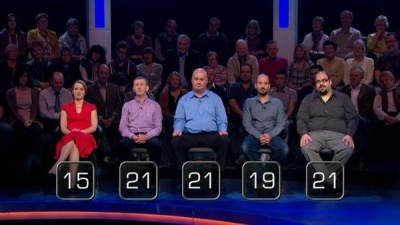 The long-awaited Gambit revival begins here!
The long-awaited Gambit revival begins here!
All of which means that John Savage has pulled off the almost-impossible feat, and gone from fifth to first to book his place in next week's final. That's at the slightly earlier time of 7.30 Friday (but the somewhat later time of next week).
This Week And Next
Nominations for the BAFTA Craft Awards were released this week. Amongst the nods for The Hour and The Hollow Crown and Seb Coe's Sports Day, there are a couple for game shows. Nikki Parsons is up in Best Director (Multi-Camera) for Strictly Come Dancing, while The X Factor (Dave Davey, Robert Edwards, Florian Wieder, Julien Rigal) is up for Entertainment Craft Team. The awards will be presented on 28 April.
Corrections: Jessie J. Last week's edition mentioned how Miss J had worked out that her head is her head, and her hands are her hands. Our flippant assertion that everyone knew such basic biology was disproven when Sharon Corr appeared on RTE The Voice of Holland of Ireland wearing a necklace that looked like a piece of clothing, one worn somewhat lower on the body. We hope we haven't put an idea into Wotsisface From The Script's head. If he turns up on the first live show with underwear on his bonce, we're very sorry.
We were also wrong to refer to the show's stars as Incredibble Spinning Chairs. If we're to believe the Daily Phone Hacker, mentors on BBC The Voice of Holland of UK have been told that their seats don't actually spin. No, these Incredibble Non-Spinning Spinning Chairs merely turn. We apologise for the confusion.
Irritation on The Common Denominator, where there were pictures of some stock cubes and some railway rolling stock, a link spotted by the contestant. "The common denominator we were looking for" is a phrase Phil Spencer doesn't get to say in our hearing again, because sloppy questions cause this column to tune out.
BARB ratings in the week to 17 March put Saturday Night Takeaway in pole position once more, 6.55m saw the fun. In It to Win It closed its run on 5m viewers, a smidge ahead of Masterchef. 4.05m for the return of The Cube, 3.15m for University Challenge, and Deal or No Deal is back to the top of Channel 4's lists with 1.45m tuning in. This show began at 4.24 pm, perhaps ratings improve in this later slot. Celebrity Juice pulled in 1.825m, the Got to Dance 4 final 1.13m, and Only Connect recorded a painful 999,000 viewers. Masterchef India was seen by 290,000 on Star Plus, around the same as Blue Peter on CBBC.
Next week, ITV invites us to Cook Me the Money (11am Mon, 2pm weekdays), Claudia Winkleman hosts The Great British Sewing Bee (BBC2, 8pm Tue), and Challenge has the UK edition of Total Wipeout (6pm). On the other hand, it's the Mastermind grand final (BBC2, 7.30 Fri). Five Minutes to a Fortune comes to Channel 4 next Saturday (5.10), with BBC The Voice of Holland of UK going up against Ant and Dec and the cast of Jersey Boys (ITV).
To have Weaver's Week emailed to you on publication day, receive our exclusive TV roundup of the game shows in the week ahead, and chat to other ukgameshows.com readers, sign up to our Yahoo! Group.

